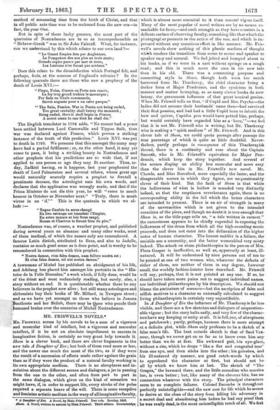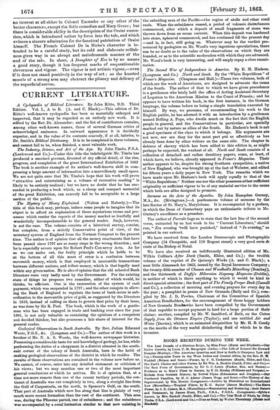MR. FRISWELL'S NOVELS'
Ma. FRISWELL seems by his novels to be a man of a vigorous and muscular kind of intellect, but a vigorous and muscular intellect., if it be not an absolute impediment to success in imaginative fiction, is certainly no very great help towards it. Sham is a clever book, and there are clever fragments in the new tale A Daughter of Eve; but both of them rend more or less, and the newer one much the most of the two, as if they were the result of a succession of efforts made rather against the grain than as if they were the product of a natural faculty working in its own appropriate medium. There is an abruptness and in- sulation about the different scenes and dialogues; a jar• in passing from the one to the other, and often from part to part in the same dialogue, which gives us the kind of sensation we might have, if, in order to support life, every stroke of the pulse required a separate heave of the will. There is some receptive and feminine artistic medium in the warp of all im aginative faculty,
* A Daughter of Eve. A Novel, by Hein Friswell. Two vole. Bentley, 1863.
Sham. A Novel, written in earnest by Hain Friswett. Third edition. Groombridge„ which is almost more essential to it than mental vigour itself. Many of the most popular of novel writers are by no means re- markable for force, =and such strength as they have consists in a delicate surface of observing faculty, something like that which the pkotographer presents to the action of the sun, and which is im- pressed without any conscious effort in like manner. Mr. Fris- well's novels show nothing of this plastic medium of thought which renders the transition from scene to scene and speaker to speaker easy and natural. We feel jolted and bumped about in his books, as if we were in a cart without springs on a rough road ; and this is much more the case in his new tale- than in his old. There was a connecting purpose an connecting style in Sham, though both were too much borrowed from Mr. Thackeray, the chief character being a darker form of Major Pendennis, and the cynicism in both manner and matter betraying, as so many clever books do now betray, the paramount influence of that great ironical genius. When Mr. Friswell tells us that, "if Cupid and Mrs. Psyche—the ladies did not assume their husbands' name then—had survived their first passion, and had had a little Cupid born to inherit the bow and quiver, Cupidon pire would have petted him, perhaps, but would certainly have regarded him as a bore,' "—we feel that it is not Mr. Friswell who is writing, but Mr. Thackeray who is making a " spirit medium " of Mr. Friswell. And in this clever tale of Sham, we could quote passage after passage the true parentage of which is quite as little doubtful. Never- theless, partly perhaps in consequence of this Thackerayish thread, there is a continuity and ease about the Captain Smooth, who is Mr. Friswell's equivalent for Major Pen- dennis, which keep the story together. And several of the scenes display an ability less muscular and more easy than the clever bits in Mr. Friswell's new novel. Mr•. Chowle, and Miss Beresford, more especially the latter, and the disagreeable scenes in which they figure, are unquestionably clever of their kind. But the fault of Sham is that while the hollowness of what is hollow is sounded very distinctly indeed, so that the emptiness reverberates again, there is no corresponding ability in the foil which the better characters. are intended to. present. There is an air of strength in many of the unveracities which is not given to the intended veracities of the piece, and though no doubt it is true enough that Sham is, as the title-page tells us, " a tale written in earnest." the earnestness appears to be chiefly expended in exposing the• hollowness of the drum from which all the high-sounding music proceeds, and does not enter into the delineation of the higher notes of human character. The honest saddler is a failure, the amiable son a nonentity, and the better womenkind very misty indeed. The attack on sham philanthropies in the person of Mrs_ Flora Gasper is ineffective, as well as, apparently at least, ill- natur•ed. It will be understood by nine persons out of ten to• be pointed at one of two women who, whatever the defects of either of them, are neither of them in any degree, however small, the worldly fashion-bunter here described: Mr. Friswell will say, perhaps, that it is not pointed at any one. If so, he- should have taken more pains not to suggest individual names, nor individual philanthropies by his description. We should nist blame the caricature of manners—but the ascription of false and selfish motives to a character so externally calculated to suggest living philanthropists is certainly very unjustifiable.
In A Daughter of Eve the influence of Mr. Thackeray is far less visible, and there are a few sketches and dialogues of unquestion- able vigour ; but the story halts sadly, and very few of the charac- ters have any keeping or unity at all. It is full, too, of abruptness and patchwork ; partly, perhaps, because there is more attempt at a definite plot, while Sham only professes to be a sketch of a false man's life. The best outside sketch is that of Saul Ven- neur, though we never get on so far as to know even him any better than we do at first. His awkward gait, his eye-glass, without a rim, which he drops " like a flat and congealed tear•" from one eye, and then sticks into the other ; his goloshes, and his ill-natured sly manner, are good catch-words by which to apprehend the character at first, but should not be all by which we know him at last. The sketch of "The Grapes," the barmaid there, and the little comedian who marries her, is even better ; but, like many of the cleverer• bits, has no connection whatever with the story. The principal characters. seem to us complete failures. Colonel Escombe is throughout perfectly unintelligible—and the new zest for life which he seems to derive at the close of the story from killing his adversary in a secret duel and abandoning him before he' had any proof that he was really dead, is the most unintelligible touch of all. We feel
no interest at all either in Colonel Escombe or any other of the better characters, except the little comedian and Mary Grace ; but there is considerable ability in the description of the Orsini execu- tion, which is introduced rather by force into the tale, and which evinces a sincere admiration for the fanatical patriotism of Orsini 'himself. The French Colonel De la Biche's character is in- tended to be a careful study, but its cold and elaborate selfish- ness gives way in an abrupt and melodramatic manner at the end of the tale. In short, A Daughter of Eve is by no means a good story, though it has frequent marks of unquestionable cleverness and vigour. The vigour is not artistic vigour,—even if it does not stand positively in the way of art ; as the knotted muscle of a strong arm may obstruct the pliancy and delicacy of the superficial nerves.































 Previous page
Previous page